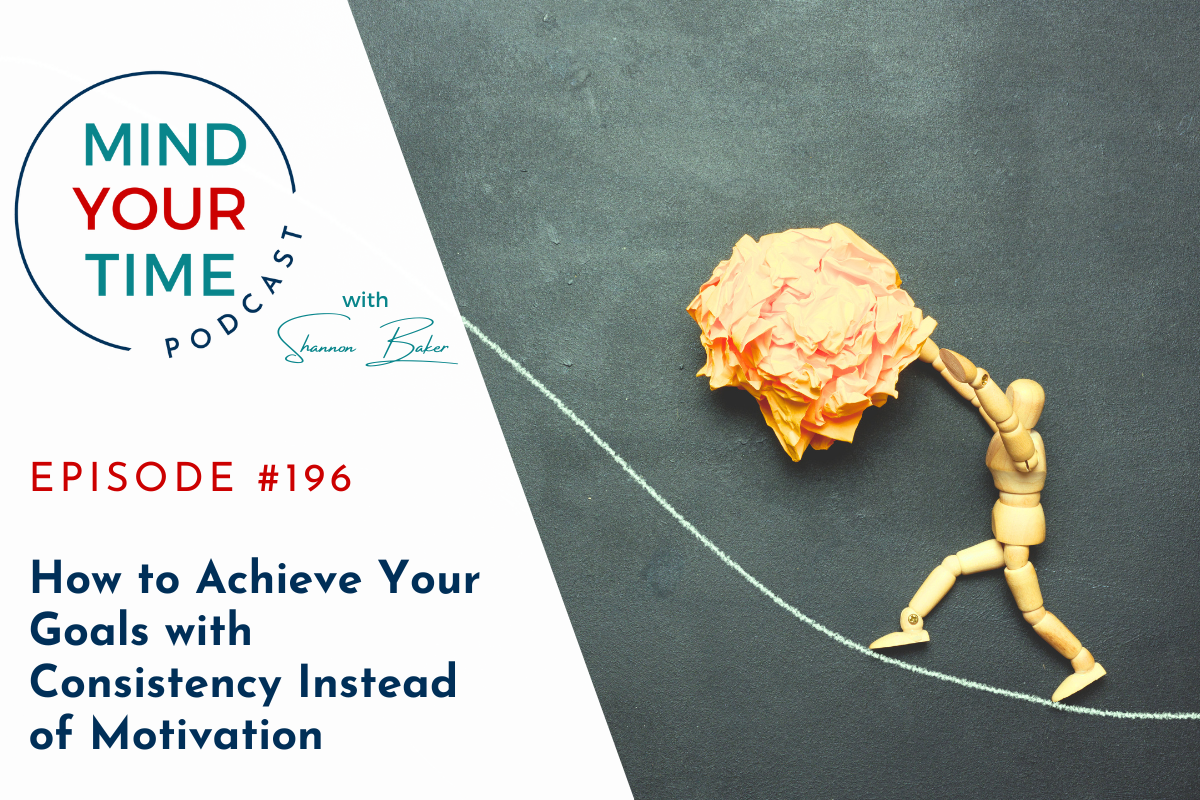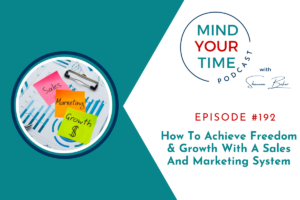Motivation can feel like magic when it hits—it gives you that spark of energy, that drive to set big goals and chase them. But let’s be real: motivation doesn’t last. It’s exciting at first, but it fades the moment life gets busy or things get hard. That’s why so many goals—personal, professional, or otherwise—end up abandoned.
If you want real, lasting results, you need a better strategy. The key isn’t working harder or waiting for inspiration to strike. The key is consistency over motivation for goal achievement.
We’ve all been there: You set a big goal, you’re fired up, and for the first few weeks, you’re crushing it. But then life starts life-ing. Your inbox fills up, a project takes longer than expected, or maybe you just don’t feel like showing up that day. Without a plan, it’s easy to fall off track, and before you know it, you’re stuck starting over again.
Here’s the truth: Motivation is unreliable. It’s a spark, not a fuel source. It might get you started, but it won’t carry you through. That’s why focusing on consistency, not motivation, is a game-changer.
We’ve all been there: You set a big goal, you’re fired up, and for the first few weeks, you’re crushing it. But then life starts life-ing. Your inbox fills up, a project takes longer than expected, or maybe you just don’t feel like showing up that day. Without a plan, it’s easy to fall off track, and before you know it, you’re stuck starting over again.
Here’s the truth: Motivation is unreliable. It’s a spark, not a fuel source. It might get you started, but it won’t carry you through. That’s why focusing on consistency, not motivation, is a game-changer.
Consistency isn’t about being perfect—it’s about showing up. It’s about building systems, habits, and routines that make it easier to take action, even on the days you’re not feeling motivated.
For example, I’ve struggled with consistency in social media marketing. It’s not my strength, and honestly, it’s not my favorite part of running a business. I used to create big plans to post daily, engage with my audience, and do all the things. But within a week or two, I’d lose momentum. Life would get busy, and I’d push it to tomorrow… then the next day… and the next.
I finally realized I needed a system to help me stay consistent. Now, I plan content in advance when I can, block out time for engagement, and focus on showing up consistently—even if it’s just in my Instagram Stories. It’s not perfect, but it works because I’ve built a rhythm I can sustain.
One of my clients had a similar struggle. She wanted to improve her social media presence but felt overwhelmed trying to post every day. We scaled her plan back to three high-value posts per week and added two short engagement blocks—one to respond to comments and another to interact with others’ content.
The results? Her stress went down, her engagement went up, and for the first time, she felt confident she could stick with her plan. Small, consistent actions made all the difference.
The best way to stay consistent is to eliminate the guesswork. Systems and routines help you avoid decision fatigue and create habits that stick. Here are a few tips to get started:
-
Start small: Focus on one or two priorities rather than trying to do everything at once.
-
Create a weekly reset: Spend 30 minutes reviewing your goals and setting your top three priorities for the week.
-
Celebrate micro-wins: Every small step you take is progress—acknowledge it!
If you’re tired of relying on motivation and starting over, it’s time to take action. Download my Biz Ops Checklist to audit your back-office systems and pinpoint where you need to focus. It’s quick, simple, and the perfect first step toward building systems that work for you.
Consistency is the bridge between your goals and your results. Start building that bridge today!
If you would like to hear the expanded version check out the podcast episode below.
2:07 – Why relying on motivation won’t get you across the finish line
3:58 – How systems, habits, and flexible routines make consistency achievable
6:30 – My personal struggle with social media marketing and the lessons I’ve learned
9:15 – Why celebrating micro wins keeps you motivated and focused on progress
12:24 – A simple challenge to help you take consistent action in your business
Welcome back to the power in motion framework series we've already covered steps one through three, which is pick one goal, organize your operations and work on the plan. And these steps give you the foundation and strategy you need to start moving forward towards your goals. But here is where the rubber meets the road. Step four, execute consistently. So today we're going to talk about the power of continuous action and why showing up consistently is the key to turning your plans into progress. I'm going to share what makes a difference between staying stuck and building real momentum, and these actionable steps will help you keep moving forward. Welcome to the mind your time Podcast. I'm Shannon Baker, your coffee loving host and business strategist, each week, I will share practical insights and bold strategies for six figure entrepreneurs looking to clean up their back office and create streamlined systems. The weekly episodes will help you take control of your time, scale your business, and create success on your own terms. So grab your cup of coffee or your favorite beverage, and let's dive into today's topic.
Did you know that 80% of the New Year's goals are abandoned by February, and it's not because people don't care, it's because they don't have a system to help them stay consistent. Sound familiar? Are you one of the millions of people who start strong only to lose steam a few weeks later, whether it's in your business, fitness or just life, you are not alone. But the truth is, the problem, isn't you, it's your approach. So today I'm calling that out, and we're going to talk about how you can execute consistently so you can finally close the gap between your goals and getting real results. Now, in last week's episode, I talked about working on the plan, taking that big goal that you've set and breaking it into smaller actionable steps. And I talked about how having a clear roadmap to your goal is so worth it, even if it takes you more than 90 days to reach it. It helps you stay focused and will help you move forward. It's really like your North Star.
But the thing is, a plan is only as good as this execution, and this is where most of the failure happens, because this is where the rubber meets the road, and things start to get real. You're excited, you're motivated, and then life starts, life in so you fall off track and you lose the initial momentum. I mean, think about it. I don't know about you, but when it comes to losing weight, I really feel like I'm always starting over. And if you're tuning into this episode, when it goes live, the New Year is right around the corner. It's like next week, so everyone's gonna rush to the gyms, because this is the year, and I say that in air quotes that they're going to lose weight, eat healthier and stick to the plan for good. The motivations there, their excitement is high and their intentions are pure. But what happens? Well, by February, half of those people are already gone, and by March, more treadmills are empty than being used, the meal plans are forgotten, and all that motivation and enthusiasm, well, it's gone.
So let's talk about why this happens. It's not because the goal wasn't important, and it's not because every person didn't have good intentions. It's because most people rely on motivation alone to get them through. Motivation is just a spark. It starts to fire. So it's exciting at first. It's bright. It can be fun, but it burns out quickly if you don't have something to keep the flames burning. So what keeps the fire burning? Well, simply put us three things, good habits, flexible routines and systems. That's what most people miss. So they set big, exciting goals, but they don't have a clear plan for how they'll consistently take action to make it happen.
So let me break this down, because systems are powerful. One, they eliminate decision fatigue because you know exactly what to do and when to do it. Two, they help you create habits over time, so what feels like effort becomes automatic later and then. Third, they help you stay consistent even when life gets busy, because the steps are already laid out, and hopefully you have some automations in place. When you have a system, you don't have to rely on how you feel in the moment to get things done.
Either it's like having a GPS for your business. You always know the next turn to take, no matter what. And as business owners, we do this all the time. Like, maybe you decide you're going to post on social media two to three times a week. Or finally, get that project management tool set up so you're excited about the idea, and you say to yourself, I am all in this time, and for the first week or two, you are crushing it. But we all know what happens. Life starts life and again. Like. Why, I may ask you for some last minute changes. You've got back to back calls because it's your busy season, your inbox is now overflowing, and then either you a kid or a parent gets sick and something has to give. So nine times out of 10, it's that new system or habit that you were working on, and you say to yourself, with good intentions, I'm going to get to it tomorrow, but tomorrow turns to next week. Next week turns to next month, and before you know it, the momentum that you had at first, it's gone, and you move on. I've been there too, and honestly, I'm still there sometimes.
Here's a perfect example, Social Media Marketing has never been my area of expertise, and I don't want it to be in to be real. Sometimes I just don't care enough to prioritize it. I will sit down, I make a plan, and I show up consistently. And let me be honest, and tell you, I do this same thing over and over again. So I will post according to my plan. I will schedule my post in advance for about a week or two, I engage with my audience all the things that we know we're supposed to do. So for maybe a week or two, I'm motivated. But then life starts life in and I look at my to do list, and when it comes to Instagram or any other social media platform, I think I'll get to it later, and then later turns into weeks of nothing, but I do stay consistent with my email marketing and this podcast.
So the problem isn't that I don't know what to do, is that I don't have a good system in place that will help me show up even when I don't feel like it. So willpower and motivation are not reliable strategies, especially for things I'm not naturally excited about. And I'm sure it's the same for you, like for me, it's social media. What is it for you? Here's what I've realized, I can't rely on motivation to carry me through. I have to create simple routines that make it easier for me to follow through. So instead of forcing myself to care more, I focus on what I can do. I plan content in advance when I Can I stick to my time blocks for engaging every day, and I aim to show up consistently in Instagram Stories, daily or regularly, but not perfectly. It's not about loving everything that I have to do. It's about building a system that helps me keep moving forward, whether I have the motivation to do it that day or not.
Think about it like this, if you want to get healthier, you don't just decide you're going to eat better, and magically you have results. I wish that was the case. You have to build routines like meal planning, because you need to get the ingredients you need in advance so that you can do meal prep on Sundays. That way you're not eating junk and you're not grabbing unhealthy takeout when things get hectic, but you've done the work to set yourself up for success by creating habits that make showing up easier. The same principle applies to your business. And I had a client who struggled with this. She actually paid for a solid marketing plan that someone created specifically for her and her business, but her execution was inconsistent. So one week, she would post according to plan, the next week, nothing. She felt like she was failing.
But the problem wasn't her effort, it was her approach. She had a lot of other things she was trying to implement, so she was doing too much at once, so we had to scale it back focus. One was to post three times a week, and they were high quality, intentional posts. Then in her schedule, we set two small, 10 minute blocks of time for her to be on social media and engage with her audience. One was to respond to her comments and DMS, and the other was to engage meaningfully with other people's content, not just liking believing good comments. And the results were almost immediate. Her engagement went up, her stress went down, and for the first time, she felt like she could stick with her plan.
So this illustrates that small, consistent actions make a difference. Here's something that I do that may help you celebrate what I call micro wins. If you complete even one small step towards your goal, like posting once on social media or setting up your weekly reset day, acknowledge it. Don't wait until you've achieved the whole goal to give yourself credit, because progress is progress, no matter how small and celebrating it keeps you motivated to keep going.
So here's a challenge for you. Think about one area of your business where consistency will make the biggest difference. It could be social media like me. And my client, or maybe it's staying on top of your schedule or actually creating one. Maybe it's client communication or getting your digital filing system in order. Whatever it is, start small and focus on being consistent, not perfect. And if you're wondering where you can start again, the biz ops checklist is a great tool. It's a simple, fillable PDF that helps you audit your back office operations and identify what parts need your focus. It doesn't take long to complete, actually less than two minutes, and once you finish, there are reflection questions to help you prioritize where to take action first, so you can start to see results right away. Grab a copy. The link is in the show notes if you haven't done that yet.
And I also want to share one of my favorite routines for staying consistent. It's my Monday weekly reset. I call it my sheEO day. I'm sure you've heard of other people doing this, but I spend 30 minutes looking at my goal, looking at what's coming up for me that week, and then deciding on my top three priorities for the week. I don't pick 1020, or 30 things, just three. This keeps me focused and ensures that I'm making progress on what matters most based on the season that my life is in. And here's the key, it doesn't have to be perfect. Some weeks I do have to adjust on the fly, and that's okay, because I have a plan. The goal is progress, not perfection. So what could a weekly reset look like for you?
Maybe it's going back to that Biz Ops checklist and picking something else to work on. Maybe it's organizing your schedule or mapping out your content for the week, whatever it is, build a routine that helps you start each week with clarity and confidence. So let's recap what we talked about. Motivation fades, but if you have good habits, flexible routines and systems, you can be more consistent. Progress will happen when you focus on taking small, consistent actions, not looking at big, unsustainable efforts, because that can be overwhelming, and having routines like a weekly reset or setting small time blocks to take care of specific tasks is going to help you stay on track even when life gets busy.
So here's my challenge for you. I want you to choose one area that you're going to focus on this week and commit to taking three small steps and then follow through on your plan. Again, that Biz Ops checklist can be your point of reference, because it's quick and easy and will give you the clarity that you need. So you know where to start.
Now, if you enjoyed today's episode, I want you to share with a fellow entrepreneur who could use a little push to be more consistent. And don't forget, next week we're going to cover the final step and the power in motion framework that's remember, refine and review, want to talk about how you can pause, celebrate your wins, learn from your challenges, and then move forward with even more clarity and purpose. So make sure you subscribe on your favorite platform and join me back here next week. Thank you for tuning in this week. Remember, just listening to this episode will not get you better results.
So I challenge you to break the mold and take action today. If you're unsure where to start, book a call with me to get your questions answered about the mighty society membership or anything else that I mentioned, a link to my calendar is in the show notes. Not ready to take that step yet. No problem.
Be sure to connect with me on Instagram at the underscore. Shannon Baker, you can ask me your questions there, or let me know that you enjoyed the episode by taking a screenshot, sharing it and tagging me if you haven't already grabbed my free audio master class, why don't you just start there? It's a great first step to assess your back office on your own, and this master class provides valuable insights and practical steps to help you organize your processes, reduce chaos and improve efficiency. Go to the Shannon baker.com, forward slash audio master class. If you haven't left a review for the podcast yet, please do so. I would love to hear from you, and it's an easy way to show some love to the podcast and help me reach more small business owners who are ready to defy the status. Whoa, I can't wait to hear from you. So until next time, keep calm and streamline you.
Resources mentioned in this post:
Let’s connect online:
Follow Me On Instagram: @the_shannonbaker




